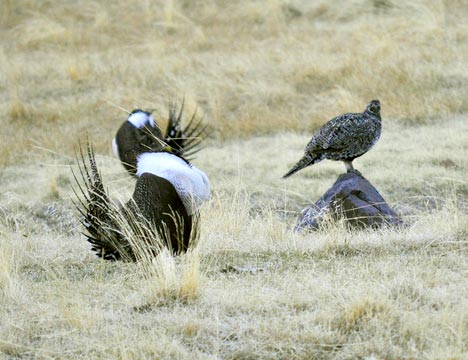Oregon
-
In a message on wildfires I just got from Congressman Greg Walden, he asserts, “A lack of management has left us with overstocked federal forests full of fuel just waiting to burn.” Unfortunately, his statement is full of misinformation. He neglects to put this into context. In the decades between the 1940s and 1980s, the…
-
In June the BLM released a draft EIS Programmatic EIS for Fuel Breaks in the Great Basin. The proposal would authorize the creation of 11,000 miles of fuel breaks primarily in sagebrush ecosystems across parts of Nevada, California, Utah, Idaho, Washington, and Oregon. https://eplanning.blm.gov/epl-front-office/projects/nepa/71149/175534/213852/FuelBreaksDraftPEIS_Bulletin.pdf This plan is a government boondoggle that will cost a significant…
-
Mountain Biking is a significant threat to our wildlands—both in designated preserves like national parks, wilderness areas, and the like, but also Wilderness Study Areas (WSA) and roadless lands that may potentially be given Congressional protection under the 1964 Wilderness Act. Wilderness designation is one of the best ways to protect biodiversity, watersheds, wildlife habitat,…
-
Juniper are more common on slopes and rocky terrain. Photo George Wuerthner The recent article on juniper mortality in central Oregon demonstrates how most forestry professors have little ecological understanding of ecosystem processes nor even the latest ecological science. In the RG article, an Oregon State University forestry professor suggests a lack of low severity…
-
Western Watersheds Project (the organization that I am the Executive Director of), WildEarth Guardians and the Center for Biological Diversity are fighting the reinstatement of grazing on four allotments in eastern Oregon that are permitted to Hammond Ranches. In part, we argue that the Hammonds don’t have a great track record and are thus undeserving…
-
I wrote this review of the potential for wolf restoration in Oregon back in 1998. It is interesting to see that many of the predictions I made have materialized. Author: George Wuerthner ABSTRACT: Wolves (Canis lupus) were native to Oregon, and reported from throughout the state. Like much of the West, wolves were persecuted and…
-
The Oregon spotted frog was originally found throughout wetlands in Oregon and Washington. It is the most aquatic of all native frogs. It is always located near perennial water sources. Draining of these wetlands, livestock grazing, and dams have significantly reduced its habitat. For instance, 95% of the wetlands in the Willamette Valley and Klamath…
-
In recent years it has become fashionable for conservationists to substitute and promote other land classification in place of wilderness designation. Wilderness is “passé” so we are told, even though it is the “gold standard” for land protection. In a recent white paper, The Wilderness Society outlined some of these alternatives such as National Recreation…

